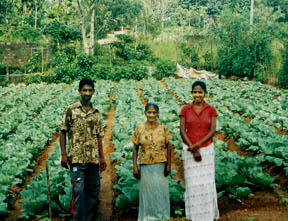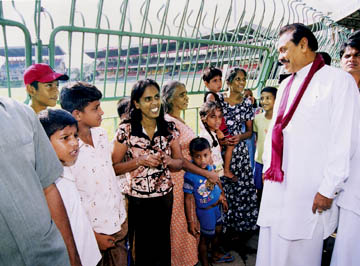|
observer |
|
|
|
|
|
OTHER LINKS |

|

|

|
Discourse on economics in a different light:The glory of thought and activity
|
|
|
The crisis in our economic life is a phenomenon brought about by 'bind' adoption of theories propagated by the theorists in the West pertaining to Economics - proper. However, associated with our present economy not only are new vistas but also are hopelessness and anguish entwined with disharmony, discord and conflict.
"Mahinda Chintanaya", however opens up one of the vistas for us in this area of thought and activity. It correctly notes, to my understanding "a political economy which deals with political nature of economic concerns" comprising right direction.
The conception, hence, makes explicit the dictum "correct politics is also correct economics." It simply means a possible fall in direction of the economic theory practised in the Industrial West and Japan. As well as the one practised by Chandrika Bandaranaike Kumaratunga's period, specially at her latter period in Sri Lanka.
This point needs unpacking. By implication, this is a paradigm - shift away from full-fledged market-oriented open economy or the lion's den which is sanctified in the Industrial West and Japan. For instance, "economics" and "politics" are categories that enwraped in different "forms of life" according to the language game of Western liberal democracy.
 Rural housing  Agricultural industries  Rural road development |
Apart from it, at present, it has brought about a dead-end where progressive human thought is dried up pertaining to supply with novel but morally fitting fountain heads of moral inspiration. Economics as an academic discipline is not an exception. Western media, with high propagandist mood, repeat this view point to drive home it as Hobson's choice for the people at large in the International community.
This brainchild of Western liberalism's chain of reasoning logically multiplies needs and enthrones profit. The massified milieux, thereby, continue to exaggerate false set of values side by side with moral quality associated with humanity.
Philosophers, sociologists, social reformers, intellectuals, etc.. continue researching into this twentieth century - malady of man and woman which is no more a mystery. Certainly, it finds its way into the new millennium also.
The concept of "False set of values" not only alienated groups in milieux and caused conflict but also negated all concerns relating to humanity at large. The projected "golden mansion" by the open economy is yet to be shown as a "house of cards." Slowly but gradually this idea now has gained ground among liberal intellectuals in South Asia and Latin America. A few young Westerners also make acquaintance of it, casually.
Political economy
It is noted that "correct politics is also correct economics." The paradigm entwined with here is the logical implication of "healing human persons who are battered by the economic crisis created by open - economic theories originated in the Industrial West."
This point is elaborated as follows: There is an expressive distinction between "Economics" and "Physics," though not shown clearly and explicitly yet. Economics, in its widest sense, is a social science whose nature and scope are different from those of Physics.
However, because of the prestige accorded to economists especially in political arena and financial all markets in the Industrial West and Japan, "discourse of open economy" has successful in formulating and propagating false theories on economics asscientific [George Soros, Open Society, 2000, Perseus Books Group, New York, pp. 38-57] There is only scientific guise here and genuine scientific laws of Physics are inoperative.
In short, an imitation of a science is the case. On the other hand, aspects of human behaviour are not governed by timelessly valid eternal laws and their logical implications are logically inappropriate.
The failure to distinguish between "social science" and "physical science" together with categorizing the former away from the latter would have solved one half of intricately intertwined theoretical issues in Economics.
For some reasons, unknown, this has not happened. The point can be elaborated as follows: What Sir Issac Newton, Albert Einstein and Werner Heisenberg thought or said or wrote did not influence reality. Yet in social sciences, what is thought or said or wrote by the social scientists impinge on reality.
For instance, though base metal cannot be turned into gold by incantation, people can get rich in financial markets and powerful in politics by propounding false theories of speculation. Once the difference between physical sciences and social sciences is made known in this way, the illusory nature of the discourse of open - market system can also be conceived.
Yet again, the following exposition of the difference is significant, is some sense. For the open - market economists, "perfect competition," "equilibrium," "self-correction of markets," "capacity for self - adjustments with recurrent economic crisis" are timelessly valid laws in economics. Without these timelessly valid laws, Economics does not operate for their brand of economists.
They simply cannot imagine Economics without these self-imposed "a priori" laws and their logical implications. Apart from it, economic prosperity and happiness of human persons cannot also be accomplished, without these timelessly valid laws in operation in the society.
In short, economic affairs in a given society are not subject to irresistible natural laws similar to those in physics. This sanctified view reigns, though positive but radical alterations are apparent, at present.
The argument of the adherents of the discourse of open-economy is increasingly unacceptable all the more so because contemporary Physics whose nucleus being the concept of probability, rejects irresistible natural laws.
That is "probability" and "irresistibility of natural laws" is logically inconsistent concepts within the parameter of contemporary Physics. The argument of the open - economy theorists hence is invalid. The invalidity here is two-faceted.
Firstly, it is logically inconsistent to enthrone Physics as accepting timelessly valid natural laws, when in fact it rejecting certainties and one-one correlations in phenomenal sequences is the case. That is, "probability" and "laws of chance" have replaced these certainties.
An enthronement of recipes of Physics by the open-market economists in the Industrial West and Japan not only is incorrect but is also misleading. And hence need to be rejected. The other facet of the enthronement relates to the high honour being erroneously conferred on economists by politicians, statesmen and administrators of the modern State.
This error has to be corrected very early and the economists have to be dethroned and be assigned the locus to which they naturally belong. This appears to be the radiant feature of the political economy intricately intertwined in the celebrated Mahinda Chintanaya.
The "political" aspect brings in politicians, statesmen, administrators, academics and intellectuals together with other experts and "economy" aspect brings in economists. To me, this makes explicit a paradigm-shift. In it there is neither enthronement nor dethronement. It is truly a genuine idea, yet wonderfully fruitful in its simplicity.
Besides, arid theories of Economics that hurt the moral well-being of the people at large are immoral. Its contrary is very clear. That is: Theories of Economics that uplift the moral well-being of the people at large is moral.
The recipe of our argument focusing the logical context must be evident now. This is mind-expanding all the more so because of ethics - orientation given to economics-proper in Mahinda Chintanaya. In this sense, activity is concerned not so much with amassing wealth by niggardly sick craving as with satisfying basic needs alone, if not complete prosperity and happiness with a moral touch.
Satisfying these needs amount to therapy and healing which are not the concepts enveloped in market-oriented economics in the Industrial West and Japan. Yet again, the market-orientation is plagued with (i) privately owning and privately controlling the means of production, (ii) profit motive, (iii) the malady of multiplying unnecessary and excessive needs, (iv) enlisting the support of the State through its greater capacity, etc.
Envisaged in Mahinda Chintanaya, however is a kind of "political economy" that ought to come into play with interrelationships, political activism and economic discourse. Dr. Douglass North, Noble laureate in Economics, 1993, is recalled. Dr, North says that "the political system ultimately shapes the economic institutions."
In the open - economics in the Industrial West and in Japan are professionally managed work - places characteristic of hiring and firing of employees. The "form of life" in the proposed economic pattern in Mahinda Chintanaya comprises no such evils. Such purposes as "hiring of employees" and "firing of employees" have no locus in this lexicon.
Both the employed and the employer pursue the purpose of fostering and prospering. This is innovatory as the guiding norm being sufficiency and not excess. The emphasis is an intricately interlaced human nucleus comprising knowledge, understanding, emotion and will of human persons in polity.
"Modern production" and its effect
The expected result is not best persons but best is persons. Therefore, while the theory of open market economics brings-forth hopelessness and anguish, the proposed political economy in Mahinda Chintanaya is entwined with partnership bringing forth hope and radiant vistas for the Sri Lanka people.
But, then, should "modern production" change its norm from "excess" to "sufficiency"? Is not it U-turn in modern production which bringsforth a serious collapse and thereafter misery, hopelessness and pain? These issues are answered optimistically by enveloping themselves within the precincts of Mahinda Chintanaya as follows:
"Modern production" is an exceedingly elastic concept which can give very different renderings in different contexts. The discourse on open-market economy in the Industrial West and Japan notes the concept of "modern production" along with that of "profit".
This is indisputable. Nevertheless, what is enveloped in this discourse is a mode of production with a political guideline which, in this discourse is a mode of production with a political guideline which, in the main, respects imperatives of social use entwined with limited needs in contrast with "greed" and "sick craving". A change of strategy and attitude is implied. Following are the derivatives:
1. The production of wealth for social use instead of excessive individual profit and indulgence;
2. avoid gauging of an individual by his/her economic might alone;
3. a given society's phenomenon of greatness and political maturity is to be gauged in terms of peace and prosperity of its people at large alone;
4. happiness and prosperity as emancipatory goals;
5. beaming satisfaction of the employer/employee alike is to be accomplished with by a psychological reawakening at the work place;
6. employer - employee relationship is to be brought up to a new paradigm by introduction of a new value namely partnership by diligence;
7. no hoarding and stockpiling for jacking up prices in the business place.
The economic order entwined with Mahinda Chintanaya is so conceived characteristically. Its sole purpose is but to sustain better and happier life and not profit alone. Human persons have basic requirements for food, clothing, shelter and medicine.
They cannot live without them, and so they engage in economic activities that meet these needs toward sustenance of life. Those societies engulfed by open - economic policies, world over, project the sole aim as profit - making alone. More precisely, things are produced solely in order to make profits.
Items which fall outside the area of profit, do not find a place in production-lines, whatever the social significance of these items are for human prosperity and happiness at large. Norms of such a mode of production are intertwined consistently, yet surely unethical and vicious in form and character.
The barometer of prosperous and happy life is not consistency, any way.
Large scale attempts are made in open-market economies, world over, to conceal profit through advertising in the media emphasizing the notion of service. However, its unethically is characteristically displayed repeatedly, when the reality of service to the customer takes the note, namely, "if no profits, no service also." This is an issue about motivation, what ought our motivation be? This should be reformulated as follows for better rendering:
"Which progressive direction should this motivation take, ethically?
This is much large issue all the more so because we are, now in the threshold of order or disorder in a given society. Order or disorder in a society, characteristically does not depend on something which falls from the skies or rises from the earth spontaneously.
It is determined, primarily, by the temperament if human persons in a given society. An order in a society is assured, only and only of human persons are influenced by private consideration of what is good for oneself in general away from what is good for oneself.
Should one were to be motivated by profit alone, and profit for oneself alone, finds the market oriented mode of production structured logically on profit. This is a vicious mode of production entwined with vicious motivation indeed.
It yields to vicious consequences, dreaded one being the temptation to manipulate any means to accomplish with one's task. Logically speaking, by way of a new and progressive value system encompassing economic theory also Mahinda Chintanaya envisages a more genuine and enduring ideal of public purpose and individual aspirations.
What is envisioned is best in persons rather than best human persons. In case the motive force is the acquisition of wealth by fair means or foul means or both means, upsurge of crime, lawlessness, violence, hopelessness, fear, etc... is not a matter for surprise. The attendant evils are diminished, should the motive force of the society were changed.
Yet again, "charity" is a non-ethical notion in the value - orientation enveloped in the discourse of open-market mode of production. It is a progressive one in a mode of production which enthrones "public purpose". "Charity" is immoral in the former value system all the more so because it is a permanent fixture.
That is to say, the continued existence of a group of people or some percentage of people in a given society depends on others for bare necessities; then the market-oriented value system is degrading to the recipients of charity and corruptive of the self-righteous givers.
There is something vicious in this system which is unwelcome. A significant version of this contention enveloped in the open-market mode of production is as follows: Should market-orientation is to be viable, it is indispensable that a certain percentage (say, generally, 7%) of workers being unemployed at any one time. When look at it in human terms, this is an evil attitude. Mahinda Chintanaya does not enthrone this phenomenon, rightly.
Means and ends: Economic systems
The concept of "means and ends" in modes of production is noted here. Granted that there are basic needs called "ends" which all human persons seek to meet and also fulfil. Nevertheless, the key issue pertains to how best these are accomplished with.
The keynote is but means towards accomplishing with this task. Pertaining to "means", two alternatives are about: (i) individualistic approach and (ii) humane approach. According to (i) above, the economic ends are to be accomplished with solely by the individual through his own efforts, working by and for himself.
Theoretically, the individual has complete freedom to achieve his economic goals in any way he pleases best or sees fit. According to (ii) above, the economic ends are fulfilled by working together jointly in family-like manner. It may also be noted as "extended family co-prosperity."
A set group planning is logically entwined with here. That planning is a prerequisite for accomplishing these social which are primary for prosperity and happiness. More precisely, the endeavours are to get the necessities of life accomplished. This humane norm is enthroned in Mahinda Chintanaya.
The ultimate social ends of any economic theory is, undoubtedly, prosperity and happiness of human persons. Yet when it comes to how best they are to be accomplished with, the market - oriented Economic discourse and partnership - oriented Economic discourse in Mahinda Chintanaya are at cross - purposes.
The former discourse in the Industrial West and Japan endorses atomistic view of the individual as an independent as well as a self-dependent unit. Both a - social and anti-social elements are logically contained in it: hence the kernel is competition. It is 'competition' in this economic - talk which bringsforth a different value -orientation in which charity begins to play a permanent role.
It logically paves way for devaluation of at least 7% of human persons (men and women) who are genuine workers but made redundant. According to the openmarket oriented discourse, they are not human persons but dehumanized cargo.
Though 'charity' in general is 'virtue' now, it has taken a dramatic turn to be 'evil'. Same is the case with 'bigness', a virtue. For instance, in large open - market - oriented economic systems, 'competition' is logically intertwined with large scale ventures inclusive of big business, big factories, big electrical systems, big communication systems etc.
In such a context, the individual becomes a hapless victim of those gigantic and impersonal enterprises and syndicates. The latest being joint ventures and mergers. The key aim being to offset competition from other sources and accomplish with monopoly in global markets for one's products alone.
Put it briefly, the one and one only aim being simply profits and profits alone. The conceptual base of this discourse perhaps may be might via mergers." All in all, "bigness" is at once working as "virtue" as well as "vice." The intricately interlaced "virtue" is "profitability through streamlined efficiency."
It is also "vice" all the more so because where "bigness" operates, the individual finds himself 'sandwiched' between gigantic forces, namely, "virtue" and "vice" which not only are outside him but are also beyond his control. It evokes aggressiveness which logically ends up in sorrow-laden conflict.
Paradoxically, embraces here are the discourse(s) on globalism, post - liberalism and the logic of the World Trade Organization. The progressive economic concepts in Mahinda Chintanaya, clearly and brilliantly dethrone all these outrageously erroneous discourses in the context of Sri Lanka in the new millennium.









